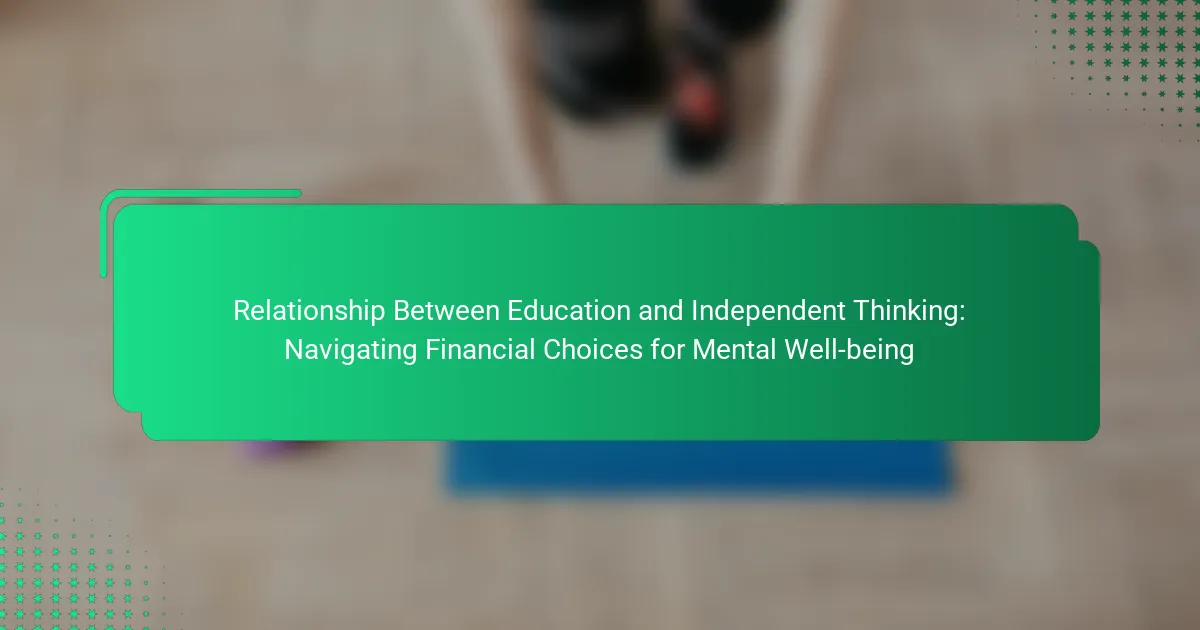Navigating financial choices is crucial for mental well-being, as informed decisions can significantly reduce anxiety and enhance self-esteem. Education enhances independent thinking, enabling individuals to critically analyze financial information and make better choices. This article explores the link between education and financial literacy, the impact of money decisions on mental health, and the importance of resilience in navigating financial challenges. Understanding these relationships can empower individuals to achieve financial stability and improved mental health outcomes.

How Does Education Influence Independent Thinking in Financial Decisions?
Education significantly enhances independent thinking in financial decisions by fostering critical analysis and informed judgment. Individuals with higher education levels tend to evaluate information more effectively, leading to better financial choices. Research shows that educated individuals are more likely to understand complex financial products and assess risks accurately. This ability to critically analyze options contributes to improved mental well-being, as informed decisions reduce anxiety related to financial uncertainty. As a result, education serves as a foundational pillar for empowering individuals in their financial journeys.
What are the key components of financial literacy?
Financial literacy encompasses key components that empower individuals to make informed financial decisions. These components include budgeting, saving, investing, understanding credit, and financial planning. Each element contributes to an individual’s ability to manage their finances effectively, enhancing their mental well-being.
Budgeting allows individuals to track income and expenses, fostering responsible spending habits. Saving emphasizes the importance of setting aside funds for emergencies and future goals. Investing introduces the potential for wealth growth through various asset classes. Understanding credit involves recognizing the impact of credit scores on borrowing and financial opportunities. Lastly, financial planning integrates all components to create a comprehensive strategy for achieving long-term financial goals.
How does critical thinking enhance financial decision-making?
Critical thinking significantly enhances financial decision-making by fostering independent analysis and informed choices. It allows individuals to evaluate financial options critically, consider long-term impacts, and avoid impulsive decisions. This process promotes mental well-being by reducing anxiety associated with financial uncertainties. Engaging in critical thinking encourages individuals to assess risks and benefits systematically, leading to more sustainable financial health.
What are the stages of developing critical financial thinking skills?
Developing critical financial thinking skills involves several key stages. First, individuals must gain foundational knowledge through education, focusing on financial principles and concepts. Next, they should practice applying this knowledge in real-world scenarios, enhancing their decision-making abilities. Third, reflection on past financial decisions helps identify strengths and weaknesses, fostering growth. Finally, continuous learning and adaptation to changing financial landscapes solidify independent thinking.
What role does emotional intelligence play in money management?
Emotional intelligence significantly enhances money management by fostering self-awareness and informed decision-making. Individuals with high emotional intelligence can better understand their financial behaviors and the emotional triggers behind spending. This awareness leads to more deliberate financial choices, reducing impulsive purchases and promoting savings. Additionally, emotional intelligence aids in managing stress related to financial challenges, which contributes to overall mental well-being. By navigating financial choices with emotional insight, individuals can create healthier financial habits that support their long-term goals.

What are the universal impacts of money decisions on mental well-being?
Money decisions significantly influence mental well-being by shaping stress levels and self-esteem. Poor financial choices can lead to anxiety and depression, while informed decisions promote confidence and stability. Research indicates that individuals with financial literacy experience lower stress and improved mental health outcomes. Furthermore, engaging in independent thinking about finances fosters resilience and enhances overall life satisfaction.
How do financial stressors affect mental health?
Financial stressors significantly impair mental health by increasing anxiety and depression levels. Individuals facing financial difficulties often experience heightened stress, leading to cognitive overload and diminished decision-making abilities. This relationship highlights the need for education on financial literacy, which empowers individuals to navigate financial choices effectively. Improved financial knowledge can reduce anxiety, fostering better mental well-being. Moreover, studies indicate that financial education correlates with lower stress levels, showcasing its unique attribute as a protective factor against mental health decline.
What are the psychological effects of debt on individuals?
Debt significantly impacts individuals’ mental health, leading to anxiety, stress, and depression. The psychological burden often stems from financial insecurity, affecting self-esteem and decision-making. Education plays a crucial role in fostering independent thinking, enabling individuals to navigate financial choices effectively. Those with higher education levels tend to manage debt better, reducing its psychological effects. Financial literacy empowers individuals, promoting healthier financial behaviors and enhancing overall mental well-being.

What unique perspectives arise from education in financial choices?
Education in financial choices fosters independent thinking, enhancing mental well-being. It empowers individuals to understand complex financial concepts, enabling informed decision-making. This unique perspective encourages critical analysis of spending habits, investment opportunities, and savings strategies. As a result, individuals develop confidence in managing finances, reducing stress related to money. Financial literacy education also promotes long-term planning, helping people set and achieve financial goals effectively.
How do different educational backgrounds shape financial attitudes?
Educational backgrounds significantly influence financial attitudes by shaping independent thinking and decision-making processes. Individuals with higher education levels often exhibit improved financial literacy, leading to better financial choices. For instance, research indicates that those with a college degree are more likely to engage in budgeting and saving practices.
Moreover, educational experiences foster critical thinking skills, enabling individuals to assess risks and benefits effectively. This ability to evaluate financial options contributes to mental well-being, as informed choices reduce anxiety related to financial uncertainty.
In contrast, individuals with limited educational backgrounds may struggle with financial decision-making, resulting in reliance on external advice or impulsive choices. This disparity highlights the unique attribute of education as a determinant of financial competence.
Overall, the relationship between education and financial attitudes underscores the importance of fostering educational opportunities to enhance independent thinking and promote healthier financial behaviors.
What innovative educational programs promote better financial decision-making?
Innovative educational programs enhance financial decision-making by promoting independent thinking and mental well-being. Programs like experiential learning initiatives, financial literacy workshops, and interactive simulations foster critical analysis of financial choices. These approaches empower individuals to understand the impact of their decisions on mental health and financial stability. As a result, they cultivate skills that lead to better financial outcomes and overall well-being.

What are the rare but significant mental impacts of financial decisions?
Financial decisions can lead to rare but significant mental impacts, including anxiety, regret, and diminished self-esteem. Individuals often face cognitive dissonance when their financial choices conflict with personal values or expectations. This mental strain can manifest as chronic stress, affecting overall well-being. Moreover, the pressure to make sound financial choices can hinder independent thinking, leading to decision fatigue. Education plays a vital role in equipping individuals with the skills to navigate these challenges, fostering resilience and mental clarity. Understanding these dynamics can enhance mental well-being in financial contexts.
How can financial decisions lead to unexpected psychological outcomes?
Financial decisions can lead to unexpected psychological outcomes due to stress and anxiety related to money management. Poor financial choices may result in feelings of inadequacy, impacting self-esteem and mental health. Research shows that financial literacy enhances independent thinking, allowing individuals to navigate choices more effectively. As a result, educated decision-making fosters a sense of control, reducing anxiety and promoting well-being.
What are the long-term effects of financial independence on mental health?
Achieving financial independence can significantly enhance mental health over the long term. It fosters a sense of control and reduces stress related to financial insecurity. Studies indicate that individuals with financial independence often report higher levels of life satisfaction and lower anxiety levels. This independence allows for more informed decision-making, promoting better emotional well-being. Moreover, financial education contributes to independent thinking, enabling individuals to navigate financial choices effectively and support their mental health.
What strategies enhance independent financial thinking in individuals?
Education significantly enhances independent financial thinking through practical strategies. Implementing financial literacy programs fosters critical thinking skills, enabling individuals to make informed financial choices. Encouraging real-world applications, such as budgeting exercises and investment simulations, reinforces these skills. Mentorship opportunities provide personalized guidance, further cultivating independent decision-making. Lastly, promoting a growth mindset empowers individuals to learn from financial mistakes, leading to improved mental well-being and resilience in financial matters.
What common mistakes do people make in financial decision-making?
People often make mistakes in financial decision-making due to lack of education and independent thinking. Common errors include failing to research options, succumbing to emotional spending, and neglecting to create a budget. Additionally, many individuals overlook the importance of seeking professional advice and misjudge the risks associated with investments. These mistakes can significantly impact mental well-being by causing stress and financial instability.
How can individuals optimize their financial choices for better mental well-being?
Individuals can optimize their financial choices for better mental well-being by enhancing their financial literacy and fostering independent thinking. Understanding financial concepts reduces anxiety and empowers decision-making.
Education plays a crucial role in developing skills for budgeting, investing, and saving. A study found that individuals with higher financial literacy report lower stress levels and improved overall mental health. As a result, investing time in financial education can lead to enhanced confidence and reduced financial-related stress.
Practicing independent thinking encourages individuals to evaluate their financial choices critically. This approach helps avoid impulsive decisions driven by societal pressures or marketing tactics. By analyzing options and outcomes, individuals can make informed choices aligned with their personal values and long-term goals.
Lastly, establishing a supportive network can bolster mental well-being. Engaging with financial advisors or community resources fosters a sense of belonging and shared learning. This support system enhances resilience against financial challenges, contributing to overall mental health.


